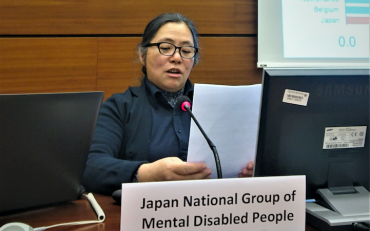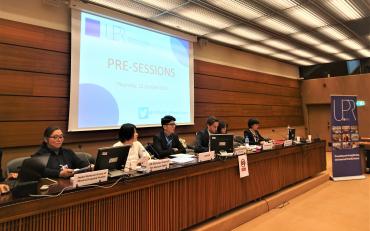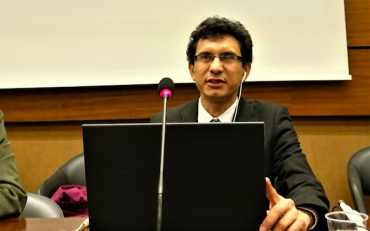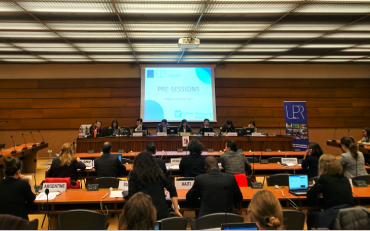Background:
The Universal Periodic Review (UPR) is a unique mechanism of the Human Rights Council (HRC) aimed at improving the human rights situation on the ground of each of the 193 United Nations (UN) Member States. Under this mechanism, all human rights situations of all UN Member States are reviewed every 5 years. Every year 42 States are reviewed within three Working Group sessions, each dedicated to 14 States. These three sessions are usually held in January/February, May/June and October/November. The result of each review is reflected in the Final Report of the Working Group, which lists the recommendations the State under review (SuR) will have to implement before its next review.
Several organisations of persons with disabilities (DPOs) participated in this UPR pre-sessions, and counted on the support of the International Disability Alliance (IDA), in collaboration with the UPR-info.
Meet some of the DPOs advocates:
During the week of the UPR pre-sessions, DPOs from Japan and Guatemala attended the event. In addition, IDA supported liaising DPOs from Gabon, Pakistan and Sri Lanka to send their reports to friend missions based in Geneva.
Yoshiko Miwa, a social security PhD student and member of the Japan National Group of Mentally Disabled People (JNGMDP) and shared several cases on the abuse against persons with psychosocial disabilities. She drew special attention to the high number of people forced into institutions. As this topic might be new for some states, Yoshiko's presence was very important to bring to the state's attention the rights of persons with psychosocial disabilities. This is especially true now that the Resolution on Mental Health and Human Rights was approved by the HRC. It will help build momentum to fight against violations to basic human rights in Japan, such as the right to live independently in the community.


During the UPR pre-session, Ms Miwa encouraged UN States to recommend to Japan to (a) establish a national human rights institution or a national monitoring mechanism on the CRPD, which should be compliant with the Paris Principles, in which members recommended by organizations of persons with disabilities; (b) repeal the guardianship system in the Civil Code and abolish Promoting the Guardianship Act; and (c) to repeal Act on Mental Health and Welfare for the Mentally Disabled and make a comprehensive deinstitutionalization plan for psychiatric hospitals.
During our conventional debriefing, she shared with IDA’s team that "I am a member of the Japan National group of mentally disabled people. Japan has many psychiatric hospitals. There are many people in hospitals in Japan, many of them stay there for the rest of their lives. The average time a person with psychosocial disabilities spend in a hospitals in OECD countries is one week. In Japan, the average time is one year! The only progress that we have been observing is that this is the second year that abuses against persons with disabilities in institutions are monitored. Yet, from our experience, the reported numbers do not reflect reality. Today, I urged UN Members states in the UPR-Info Pre-session to recommend Japan to follow the CRPD, and we are planning to submit a shadow-report to the CRPD Committee. We need to keep this fight alive, because Japan has been violating several human rights treaties, we are not observing any improvements so far. Moreover, a new law on guardianship has been enacted for persons with psychosocial disabilities. Many persons are protesting but avoiding guardianship seems impossible.”
This is not Yoshiko’s first time in Geneva. She also came for CEDAW in the last year. She is preparing some recommendations with data and with some cases that she will present in the framework of the Convention on the Rights of Persons with Disabilities (CRPD), the Convention Against Torture (CAT) and the Convention on the Elimination of all forms of Discrimination Against Women (CEDAW).
The International Disability Alliance also contributed in the support of a Guatemalan DPO. Gabriel Escobar, from the Association of the Blind for Culture and Sport Pro-Blind and Deaf Committee of Guatemala. He worked with a delegation of several Guatemalan NGOs, known as “the coalition” working on different human rights fields, including indigenous peoples, food security, youth and freedom of speech for local communities.


Regarding persons with disabilities, Gabriel urged UN member states to recommend in the UPR Review of Guatemala to implement and fulfill all the obligations assumed under the Convention on the Rights of Persons with Disabilities and allocate a budget to ensure its implementation; to repeal the laws that are incompatible with the CRPD, to establish complaint and justice mechanisms accessible to persons with disabilities; (b) to include persons with disabilities into the next National Population Census; and (c) to remind Guatemala to to implement SDGs, inclusive of persons with disabilities.

